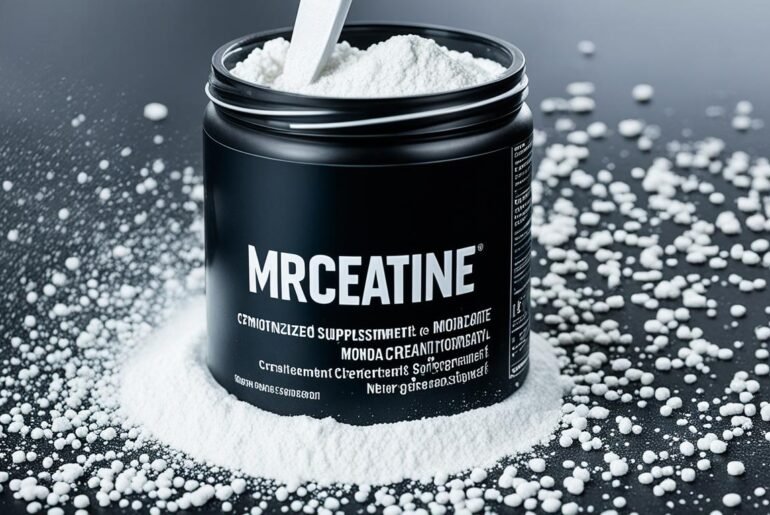Did you know that despite concerns surrounding creatine supplementation and hydration, research indicates no significant impact on the hydration status of individuals? As a fitness enthusiast deeply engaged in sports nutrition and workout supplementation, I was intrigued by findings that show creatine, a staple in many athletes’ regimens, does not contribute to dehydration or heat intolerance. With **creatine and hydration in fitness** being critical components for optimal performance, these revelations have important implications for how we approach fitness hydration and supplementation strategies.
Key Takeaways
- Scientific evidence supports the safe use of creatine in fitness routines without dehydrating effects.
- Understanding the true impact of creatine on hydration is crucial for effective sports nutrition planning.
- Appropriate hydration strategies enhance the benefits of workout supplementation with creatine.
- Knowledge about the synergistic effects of creatine and water intake can maximize fitness outcomes.
- Debunking the myths about creatine and dehydration informs more informed choices in supplement use.
Understanding Creatine’s Role in Muscle Performance
When it comes to elevating muscle strength and improving workout results, creatine monohydrate has garnered considerable attention in the fitness and athletic worlds. As a fundamental component in sports nutrition, creatine’s effects on muscle performance are grounded in sound scientific findings and should be considered by any dedicated fitness enthusiast.
The Scientific Basis of Creatine Monohydrate
At its core, creatine monohydrate functions to drastically increase the concentration of muscle phosphocreatine. This increase can be as substantial as 50%, providing a substantial boon to the body’s phosphagen system. This enhanced capacity has a direct impact on enhancing muscle output during strenuous physical challenges where immediate energy is paramount.
The phosphagen energy system, primarily involving adenosine triphosphate (ATP) and creatine phosphate (CP), is the first responder to energy demands during high-intensity, explosive exercises. When I delve deeper into the physiology, it’s the resynthesis of ATP by CP— a process enhanced by creatine—that allows for the continued explosive muscle contractions.
How Creatine Supports Anaerobic Workouts
During the high-energy demands of anaerobic workouts, our muscles turn to the most readily available energy source. With creatine monohydrate supplementation, I’ve observed a noticeable improvement in my ability to perform repetitive high-intensity exercises with less fatigue. It’s not just about augmenting one’s peak power; rather, it involves sustaining those peaks through what feels like a supercharged recovery process.
It’s also crucial to mention that numerous studies have addressed the myth concerning creatine’s supposed role in dehydration and heat-related complications. Far from being detrimental, there’s a growing body of scientific literature suggesting that appropriate creatine intake does not impair hydration but may actually contribute to its enhancement. In well-hydrated individuals like myself, creatine has been shown to potentially play a part in attenuating thermal stress, effectively contributing to a more resilient and hydrated cellular environment during workout sessions.
The takeaway is abundantly clear—from bolstering phosphocreatine stores to improving anaerobic performance and contributing to the muscle’s phosphagen system, creatine monohydrate stands as a powerful ally in the realm of muscle performance and recovery. As a professional athlete or a fitness enthusiast, embracing the scientifically-supported benefits of creatine could very well be the next step in achieving peak physical prowess.
Assessing Creatine’s Impact on Athletic Performance
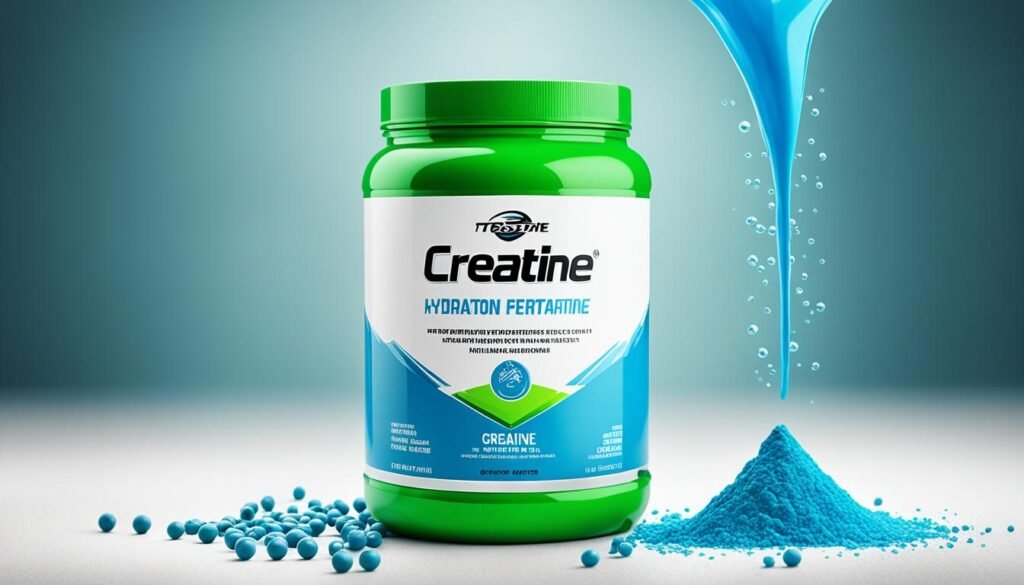
In my exploration of workout supplementation, I’ve discovered that nothing quite compares to creatine when we consider its profound impact on athletic performance. Known to ramp up strength enhancement and support high-intensity training, creatine supplementation appears to be a game-changer for athletes and fitness enthusiasts alike. Let’s delve into the specifics of how this powerful supplement transforms physical prowess.
Enhancements in Strength and Power
There’s a substantial body of research underscoring the benefits of creatine for increasing muscle strength and power output. By bolstering muscle phosphocreatine stores, creatine supplementation empowers individuals to push through maximal effort exercise bouts and increases the anaerobic threshold, thereby escalating strength enhancement outcomes appreciably.
Given that athletic performance hinges on an athlete’s power and force, integrating creatine into one’s workout supplementation regime can mean the difference between good and great results. The repetitive and demanding drills inherent in high-intensity workouts necessitate quick recovery—and that’s precisely what creatine delivers.
Creatine’s Influence on High-Intensity Training
Another realm where creatine truly shines is in the domain of high-intensity training. The intensity of such workout regimens requires rapid and efficient energy replenishment within the muscle—something that increased intramuscular creatine levels facilitate effectively, ensuring improved and sustained performance.
Critics may have pointed fingers at creatine, hypothesizing potential risks under heat-stress conditions. But my investigation unveils a different narrative: not only does creatine not impair hydration or thermoregulatory responses, but it also stands as a beacon of safety and efficacy, optimizing an athlete’s high-intensity performance without the risks of dehydration or heat intolerance.
To conclude, the scientific evidence for the positive impact of creatine on strength, power, and high-intensity training performance is convincing. It’s no longer a question of whether creatine works, but rather how we can best leverage this supplement to unlock the pinnacle of our athletic potential.
The Physiology of Hydration for Workout Optimization
When I take to my workouts, I’m keenly aware that maintaining a body fluid balance is as crucial as the exercise itself. It’s not just about drinking water; it’s about when and how much. Research underscores that for peak exercise performance, our water intake should match the rate at which we’re losing fluids through sweat and evaporation.
Understanding this, I focus intently on fitness hydration, a cornerstone of exercise science. My cells depend on adequate hydration to function correctly. This isn’t just textbook theory; it’s palpable. On days where my hydration is on point, I can feel my body responding more effectively to my fitness regimen, letting me push boundaries safely.
Hydration is such a simple thing but with complex implications. It’s the difference between performance peaks and performance plummets.
To dive deeper into how water intake influences my workouts, I look at hydration from a cellular level. Every cell requires water to transport nutrients, flush out waste, and maintain electrical properties that power muscle contractions. Put simply, without proper hydration, my cells can’t produce the energy I need, nor can they recover well post-exercise.
- Staying properly hydrated helps regulate body temperature and maintain blood pressure.
- Optimal hydration can improve concentration and cognition, affecting strategic thinking and coordination during a workout.
- Proper body fluid balance ensures that nutrients from my diet and supplements, like creatine, are effectively distributed.
I have made a habit of systematically monitoring my fluid intake in relation to my workout intensity and duration. It’s a practice I know pays dividends, not just in immediate performance improvements, but also in long-term health and fitness progression.
Creatine Supplementation: Balancing Muscular and Systemic Hydration

In the realm of fitness, creatine supplementation has been closely scrutinized for its impact on muscle hydration and overall body water balance. Understanding the way creatine influences our body’s hydration state is crucial to integrating this supplement effectively into our workout regimens.
How Creatine Affects Water Distribution in the Body
When I embark on a creatine loading protocol, I’m acutely aware of the supplement’s role in pulling water into my muscle cells. This process is crucial for achieving the intracellular swelling that appears to aid in my muscle growth and endurance. But here’s the catch: while muscle cells get hydrated, the rest of my body’s systemic hydration should not be overlooked. Proper water intake during this phase ensures that I am fully utilizing the creatine’s potential without sacrificing overall hydration.
Importance of Water Intake During Creatine Loading
Ensuring adequate water intake during the creatine loading phase is paramount. I approach this phase with a systematic increase in my water consumption, balancing the heightened needs of my muscles with the continuous requirements of my systemic hydration. For instance, I imbue my routine with additional glasses of water throughout the day, especially with each creatine dose, to maintain equilibrium.
| Phase | Creatine Intake | Suggested Water Intake |
|---|---|---|
| Loading | 20-25 grams per day | Extra 16-24 ounces per dose |
| Maintenance | 3-5 grams per day | Standard 8-10 glasses |
| Hydration Focus | Consistent with dosage | Increased for systemic balance |
In conclusion, my practice of creatine supplementation requires an informed and attentive approach to fluid intake, as both muscle and systemic hydration are fundamental for optimized performance and health. By staying vigilant and proactive with my water consumption, I align my body’s hydration needs with the demands of both my workout and my supplementation strategy.
Demystifying Myths: Creatine and Dehydration Concerns
As a dedicated advocate for exercise safety and sports nutrition, I’ve observed the persistence of various creatine myths, particularly surrounding dehydration concerns. A common fallacy is that creatine supplementation leads to dehydration and related complications. Nevertheless, recent scientific findings have effectively refuted these claims, assuring athletes and fitness enthusiasts about the safety of incorporating creatine into their regimes.
Legitimate research, including controlled trials and comprehensive reviews, has consistently shown that appropriate creatine use, coupled with sufficient water intake, does not compromise the body’s hydration state or impair thermoregulatory capacities. My mission here is not only to inform but to put to rest the undue worries that may deter individuals from experiencing the benefits of creatine supplementation.
Allow me to present a simple analysis that encapsulates what has been gleaned from the evidence at hand:
| Myth | Scientific Evidence | Implications for Athletes and Recreational Users |
|---|---|---|
| Creatine causes dehydration and cramping. | Studies show no increased risk of dehydration with proper hydration. | Users can safely continue using creatine, with attention to water intake. |
| Creatine is risky under warm conditions. | Research indicates creatine does not affect body’s ability to regulate temperature. | Training in heat is safe with creatine when hydration is monitored. |
| Heat-related illnesses are exacerbated by creatine. | No significant evidence supports this claim. | Safety of creatine affirmed when combined with adequate water consumption. |
In conclusion, the unfounded fears associated with creatine and dehydration concerns have been largely disproven by empirical evidence. Normal, tension-filled workouts can indeed be fortified with the right amount of creatine without jeopardizing one’s hydration status. Awareness and education regarding exercise safety and sports nutrition are pivotal in continuing to leverage creatine’s full potential. It’s a component of your training that, when used judiciously, can support your fitness journey extensively.
Dosage and Water Intake: Best Practices for Creatine Users
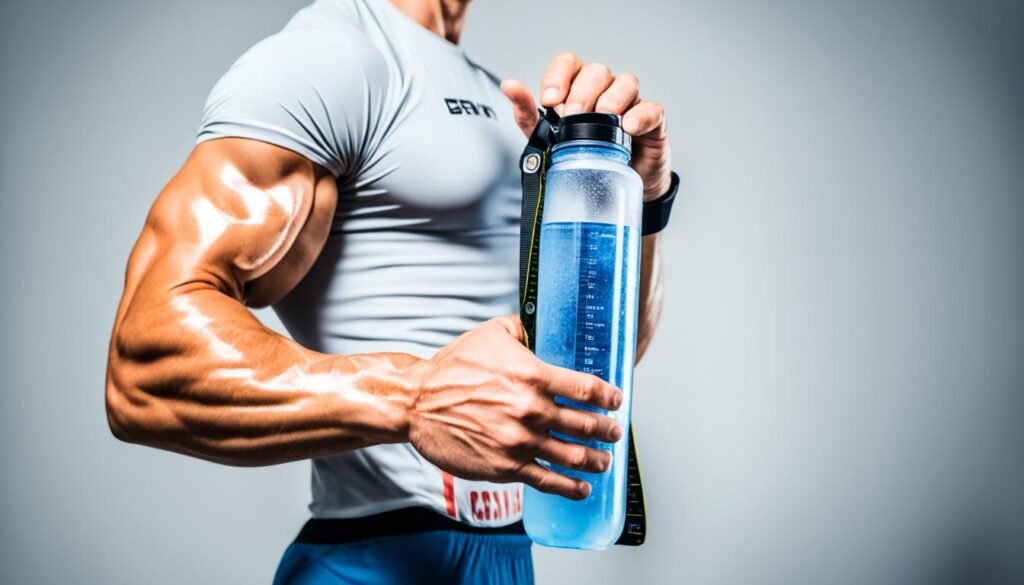
When integrating creatine into your fitness supplementation protocol, understanding the optimal creatine dosage and implementing effective hydration strategies are crucial for maximizing benefits and maintaining health. Let’s break down the best practices to ensure you’re getting the most out of your supplement routine.
Recommended Creatine Dosage for Athletes
For those looking to enhance their athletic performance, a daily maintenance dose of 3 to 5 grams of creatine is generally recommended. This dosage has been shown to sustain the elevated muscle creatine stores needed for improved strength and power. During the initial week, known as the loading phase, a higher intake of 20 to 25 grams per day, divided into four to five servings, is often suggested to quickly maximize muscle creatine levels.
Strategies for Adequate Hydration with Creatine
Adequate water intake is not only essential for general well-being but also plays a pivotal role when taking creatine. To ensure proper dissolution and uptake of creatine, it’s vital to consume at least 8 ounces of water with each dose. Furthermore, the natural propensity of creatine to draw water into your muscles underlines the need for increased daily hydration. Aim for 3 to 4 liters of water, or 12 to 16 cups, to compensate for the fluid retention associated with creatine and to replenish what’s lost during heavy sweating in workouts.
| Creatine Phase | Dosage | Water Intake | Duration |
|---|---|---|---|
| Loading | 20-25g/day | 8 oz per dose | 5-7 days |
| Maintenance | 3-5g/day | 3-4 liters/day | Indefinite |
Remember, fine-tuning your creatine dosage and staying on top of your hydration strategies are key to a successful fitness supplementation protocol. By following these practices, you can help promote optimal muscle hydration, enhance exercise performance, and maintain good health.
The Interplay Between Fitness Hydration and Creatine Supplementation
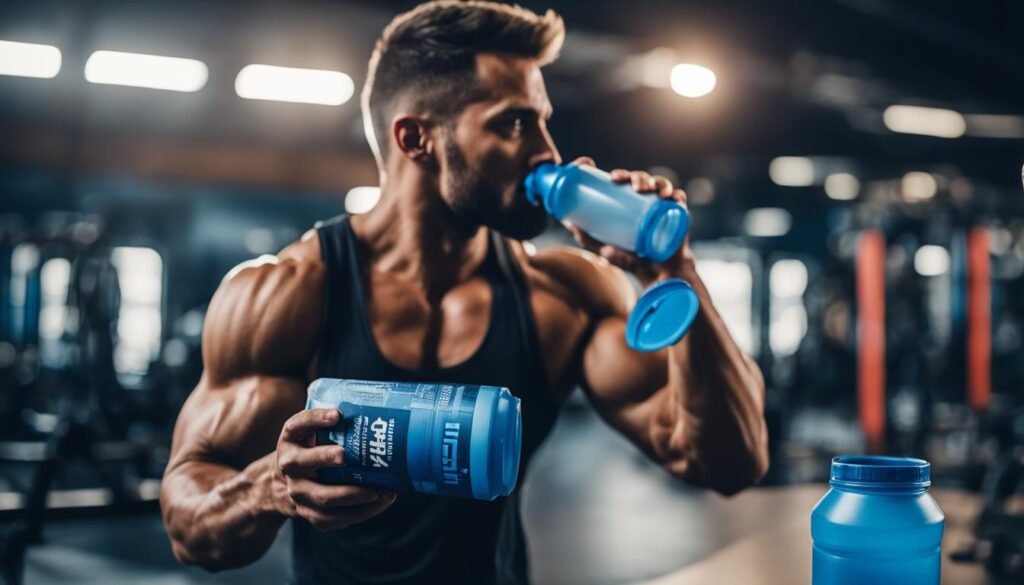
As someone deeply immersed in the fitness industry, I’ve witnessed firsthand how creatine and hydration in fitness are two crucial factors that work in tandem to enhance workout results. Creatine supplementation is well-known for its ability to increase cellular energy, which is essential for high-intensity workouts. But the benefits extend beyond just energy. Creatine also promotes water retention in muscle tissues, which can result in increased muscle volume and ultimately contribute to strength and power gains.
To optimize the efficacy of creatine, adequate hydration is non-negotiable. I always advise athletes to monitor their fluid intake closely. It’s not just about drinking water; it’s about ensuring that the water retention effects of creatine are maximized, which in turn, supports the enhanced muscle performance we all strive for. Let’s explore how these elements interact more closely.
- Hydration is key to fitness: Without it, even the best supplement stack won’t deliver the results you’re after.
- Understanding creatine’s role in water retention: This is critical for those looking to harness its full potential in their training regime.
- Maintaining a balance: It’s about striking the right balance between supplement intake and water consumption for optimal health and performance.
In my experience, paying attention to these details has made a significant difference in not only my personal workout results but also those of the athletes I have worked with. It’s clear that when creatine and hydration are properly aligned, the path to peak performance becomes much more attainable.
Maximizing Exercise Performance with Creatine and Proper Hydration
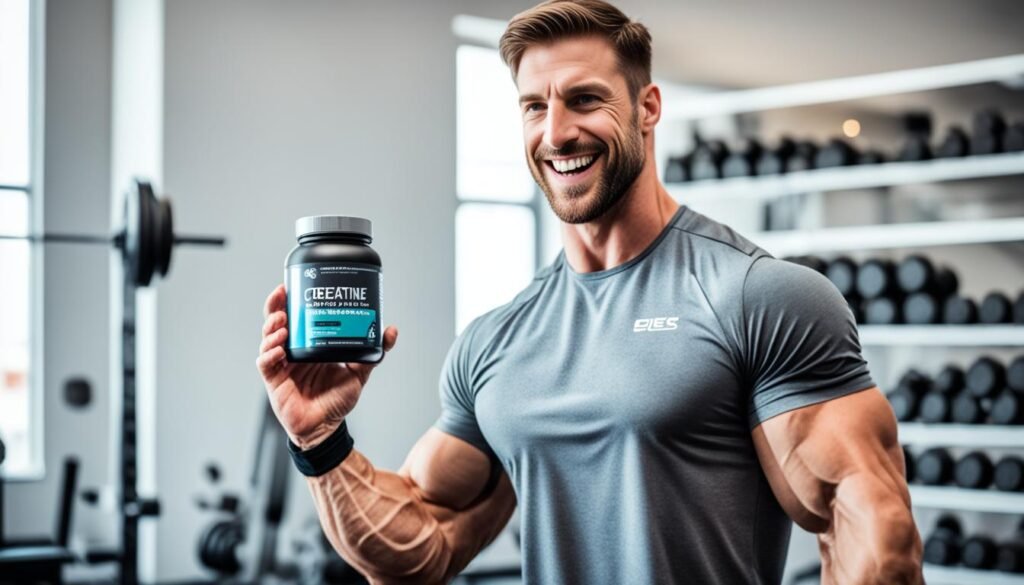
As I delve into the realm of fitness enhancements and sports nutrition, I recognize the critical role of creatine in maximizing exercise performance. Coupled with proper hydration, it forms a synergy that not only optimizes cellular energy production but also pushes our capabilities during strenuous sessions. Here I’ll share how these two pivotal elements can be harnessed to full effect.
Optimizing Cellular Energy During Workouts
In my quest for peak athletic output, I’ve found that nothing fuels my short-duration, high-intensity activities quite like creatine. By optimizing cellular energy, it allocates an abundance of power and endurance right where I need it most. Creatine empowers me to harness that extra gear, enhancing the overall energy available to my muscles and, consequently, the intensity of my training.
Key Hydration Tips for Creatine Enhanced Training
When it comes to creatine enhanced training, I’ve learned that hydration is not just a side note—it’s a key player. Here’s how I ensure I’m never caught short on hydration:
- I start hydrating well before my workout, sipping water throughout the day to prepare my body for the demand ahead.
- During my exercise sessions, I increase fluid intake to counterbalance the additional requirement due to creatine’s muscle saturation effect.
- Post-workout, I make it a point to replenish not just with water but with an electrolyte solution to restore any imbalances.
Attentive to these hydration needs, I unlock the full potential of creatine to amplify my performance without the downside of dehydration.
Addressing Creatine Monohydrate and Its Osmotic Effects on Muscles

As a fitness enthusiast, my training routine is consistently aimed at optimizing muscle growth and strength. A key factor in this pursuit is the integration of creatine monohydrate, well-known for its contribution to muscle hydration and size expansion. The osmotic effects of creatine monohydrate are quite fascinating; once muscles become saturated with this supplement, their capacity to attract and retain water increases. This is not just a matter of appearance–with greater size and fullness, the muscles also receive a signal to grow.
During strength training, the osmotic influences of creatine really come into play. This cell-volumizing effect supports my training efforts as it helps in the creation of an anabolic environment conducive to muscle growth. I’ve noted that with creatine supplementation, there is an initial gain in water weight, a common experience among many who start on creatine. Yet, this weight gain tends to stabilize over time as the muscles adapt to the higher creatine levels.
It is absolutely crucial to maintain an increased intake of water to fully benefit from these osmotic properties. This means that throughout my muscle-enhancing regimen, water is as essential as the weights I lift. It’s quite clear that for those pursuing sizeable gains, understanding and utilizing the osmotic effects of creatine monohydrate can lead to remarkably improved results from strength training efforts.
Scientific Evidence: Creatine’s Safety and Efficacy in Hydration
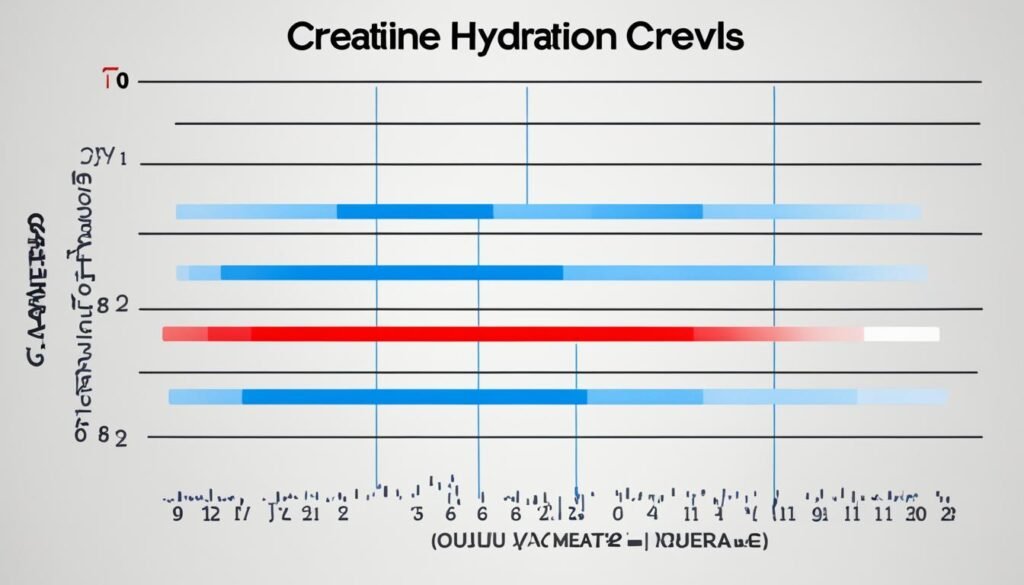
In my exploration of creatine’s role in fitness regimes, I have encountered numerous studies that advance our understanding of creatine safety and hydration efficacy. Today, I’m delving into the expansive pool of scientific evidence that addresses one of the most persistent concerns about creatine—its impact on dehydration and heat tolerance during workouts.
Studies Disputing Dehydration Myths about Creatine
Scientific evidence has been critical in challenging the widespread myths about creatine leading to dehydration. An array of controlled studies have been conducted with trained athletes, and the outcomes are consistent: creatine does not impair the body’s hydration status nor its ability to manage heat even in dehydrated states. This sheds light on the factual hydration efficacy of creatine when used as part of a fitness regimen.
Resolving the Controversy: Heat Tolerance with Creatine Use
Concerns surrounding heat tolerance during exercise while supplementing with creatine have also been put to the test. Findings have shown that key physiological measures such as heart rate and plasma osmolality remained stable, indicating that creatine supplementation does not increase the risk of heat-related issues. These results firmly establish creatine safety in the context of strenuous workouts under thermal stress.
| Measurement | Control Group | Creatine Group |
|---|---|---|
| Heart Rate | No significant change | No significant change |
| Arterial Pressure | No significant change | No significant change |
| Plasma Osmolality | Remained within normal range | Remained within normal range |
| Urine Osmolality | Remained within normal range | Remained within normal range |
I’m encouraged by the overwhelming body of evidence which supports the alignment of scientific rigor with real-world application. As it stands, the consensus in the scientific community is unwavering—when it comes to integrating creatine into a hydration-conscious fitness routine, the dangers once feared appear to be unsubstantiated by current research.
Conclusion
In reflecting on the hydration dynamics integral to effective fitness regimens, it’s clear that creatine monohydrate holds a definitive place in the enhancement of muscle performance. The concern that this powerful supplement might impair hydration has been extensively scrutinized and the consensus within the scientific community is reassuring. My deep dive into the relationship between creatine supplementation and hydration underscores the necessity of a strategic, informed approach to both elements.
Summary of Creatine’s Hydration Dynamics in Fitness Regimens
The summary of my investigation into the role of creatine within fitness regimens reveals a complex yet symbiotic interaction with the body’s hydration processes. When integrated correctly, creatine not only bolsters muscle performance but also maintains a neutral—or potentially beneficial—impact on hydration dynamics. I’ve assimilated a wealth of research ensuring that the fitness enthusiast’s quest for peak physical condition does not come at the cost of the body’s essential water balance.
Final Recommendations for Creatine Intake and Hydration Strategies
Given my insights into the mutual dependence of water and creatine in the body, I recommend that anyone engaged in regular fitness activities adhere to established creatine intake recommendations. Such guidance doesn’t merely suggest the ideal amounts and timing for creatine consumption; it also emphasizes the importance of accompanying this regimen with vigilant water intake. Indeed, crafting, a hydration strategy that parallels creatine usage is paramount, ensuring that every cell can function at its peak, thus fostering an environment for workout optimization. By honoring these principles, individuals can maximize the benefits offered by creatine, all the while keeping their system adeptly hydrated.
FAQ
What is the role of creatine monohydrate in muscle performance?
Creatine monohydrate (CrM) significantly enhances muscle performance by increasing muscle phosphocreatine content, which facilitates stronger and more efficient muscle contractions. It enhances athletes’ strength, power, and recovery during anaerobic workouts.
How does creatine supplementation impact athletic performance?
Creatine supplementation is proven to improve athletic performance by increasing muscle phosphocreatine stores. This functional increase allows for more intense exercise bouts, enhances anaerobic capacity, and facilitates rapid recovery between high-intensity efforts.
Why is hydration important in fitness and when using creatine?
Hydration is crucial for maintaining fluid balance, supporting cellular functions, and preventing heat-stress. In the context of creatine use, proper hydration ensures the body can effectively manage the added physiological demands of exercise and supports creatine’s role in enhancing workout performance.
How does creatine affect water distribution in the body?
Creatine affects water distribution by drawing water into muscle cells, potentially increasing body water content, muscle mass, and total body water. This osmotic effect is why users should increase their water intake to maintain hydration during creatine supplementation.
What are the common myths about creatine and dehydration, and what does scientific evidence say?
Myths suggest that creatine supplementation increases the risk of dehydration and heat-related illnesses. However, scientific evidence shows that creatine does not disrupt hydration status or thermoregulation, debunking these misconceptions.
What is the recommended creatine dosage for optimal athletic performance, and how much water should be consumed with it?
For most athletes, the recommended creatine monohydrate dosage is 3 to 5 grams daily, with a loading phase of 20 to 25 grams per day for 5 to 7 days. It’s advised to consume at least 8 ounces of water with each dose and increase overall water intake to 3 to 4 liters per day to accommodate creatine usage and exercise-induced fluid loss.
How do fitness hydration and creatine supplementation interact?
Creatine draws water into muscle tissue, aiding in muscle performance and volume increase. This requires athletes to stay well-hydrated to support the water-retention effects of creatine and maintain general physiological hydration needs.
What are the key hydration tips for training with creatine supplementation?
Users should consume extra water to support creatine’s muscle-hydrating benefits effectively. Maintaining a high level of hydration helps to accompany the osmotic and energizing effects of creatine during workouts for improved performance.
What are the osmotic effects of creatine monohydrate on muscles?
The osmotic effects of creatine monohydrate involve muscle saturation with creatine, leading to increased water attraction within muscle cells. This results in muscle size and fullness gains and an anabolic environment conducive to muscle growth.
How do studies address the concerns of dehydration associated with creatine use?
Studies resolving dehydration concerns have shown that creatine supplementation does not compromise hydration or thermoregulatory responses even in dehydrated athletes performing in heat-stress conditions. Thus, with proper hydration, creatine is safe and does not heighten dehydration risk.




